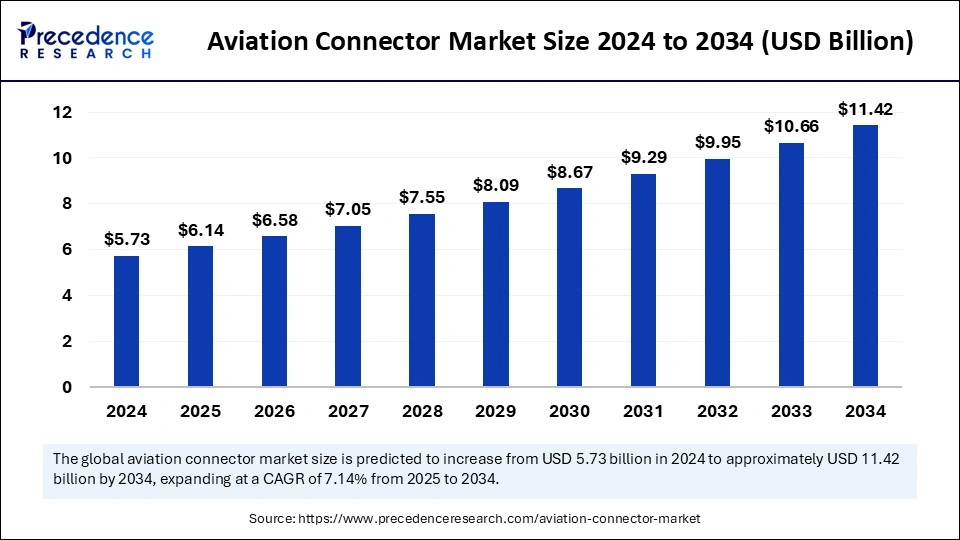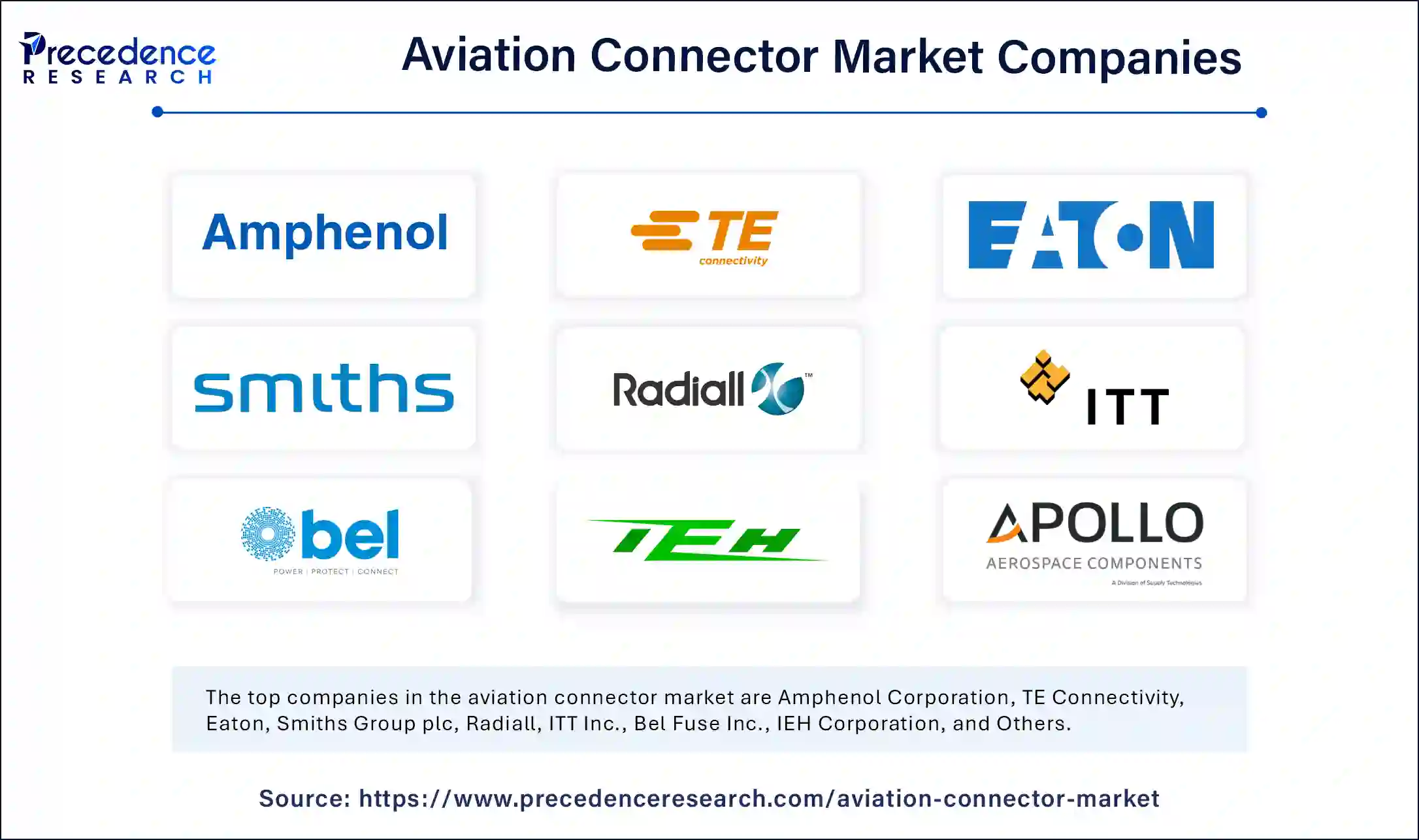The global aviation connector market size was valued at USD 5.73 billion in 2024 and is expected to reach around USD 11.42 billion by 2034, growing at a CAGR of 7.14% from 2025 to 2034.

Aviation Connector Market Key Points
-
North America led the market, capturing a 36% share in 2024.
-
The Asia Pacific region is forecasted to grow at the highest CAGR of 10% in the upcoming years.
-
The fiber optic connectors segment dominated the market by type, holding a 31% share in 2024.
-
The high-power connectors segment is projected to experience the fastest growth throughout the forecast period.
-
Among aircraft types, the commercial aircraft segment accounted for the largest market share in 2024.
-
The business and general aviation aircraft segment is expected to see significant growth over the forecast period.
-
The engines segment held the leading market position by application in 2024.
-
The in-flight entertainment (IFE) systems segment is expected to register the highest CAGR in the coming years.
Get a Free Sample Copy of the Report@ https://www.precedenceresearch.com/sample/5769
Role of AI in the Aviation Connector Market
Artificial Intelligence (AI) is playing a transformative role in the aviation connector market, enhancing the design, manufacturing, performance, and maintenance of connectors used in aircraft systems. AI-powered algorithms are enabling predictive analytics, which helps in identifying potential failures in aviation connectors before they occur, reducing downtime and maintenance costs. This predictive maintenance approach enhances aircraft safety and operational efficiency by preventing unexpected failures in critical systems such as avionics, in-flight entertainment, and power distribution.
Furthermore, AI is optimizing the design and manufacturing of aviation connectors by using machine learning models to analyze material properties, electrical performance, and environmental factors. This ensures the development of more durable and efficient connectors capable of withstanding harsh aviation conditions. AI-driven automation in production lines is also improving manufacturing precision, reducing defects, and increasing production efficiency. Additionally, AI is enhancing real-time data monitoring of connectors, enabling airlines and aircraft manufacturers to track performance metrics and improve overall connectivity reliability. As AI continues to advance, its integration into aviation connectors is expected to lead to smarter, self-monitoring, and more efficient connectivity solutions, driving further innovation in the aerospace industry.
Aviation Connector: Overview and Key Insights
Overview
Aviation connectors are specialized electrical connectors designed for use in aircraft systems, ensuring reliable signal and power transmission in harsh environments. These connectors are built to withstand extreme temperatures, vibrations, and electromagnetic interference while maintaining high performance in aerospace applications. They are essential components in avionics, flight control systems, in-flight entertainment, and communication networks.
Key Features of Aviation Connectors
-
High Durability – Resistant to extreme temperatures, pressure changes, and mechanical stress.
-
Lightweight & Compact – Designed to reduce aircraft weight while ensuring high efficiency.
-
EMI & RF Shielding – Protects against electromagnetic interference for uninterrupted performance.
-
Sealed & Corrosion-Resistant – Offers protection against moisture, chemicals, and environmental factors.
-
High-Speed Data Transmission – Supports modern aircraft systems with fast and reliable connectivity.
Types of Aviation Connectors
-
Fiber Optic Connectors – Used in high-speed data transmission for avionics and communication.
-
High-Power Connectors – Designed for electrical power distribution in aircraft systems.
-
RF Connectors – Used for wireless communication and radar systems.
-
Circular Connectors – Commonly used in avionics and flight control applications.
-
Rectangular Connectors – Provide high-density connections for complex aircraft systems.
Applications of Aviation Connectors
-
Avionics Systems – Used in navigation, flight control, and cockpit instrumentation.
-
Engines & Power Distribution – Ensure seamless power transmission to aircraft components.
-
In-Flight Entertainment & Connectivity – Supports passenger screens, Wi-Fi, and communication systems.
-
Radar & Communication Systems – Essential for air traffic control and military applications.
-
Cabin Lighting & Safety Systems – Integrated into aircraft lighting, emergency systems, and sensors.
Market Scope
| Report Coverage | Details |
| Market Size by 2034 | USD 11.42 Billion |
| Market Size in 2025 | USD 6.14 Billion |
| Market Size in 2024 | USD 5.73 Billion |
| Market Growth Rate from 2025 to 2034 | CAGR of 7.14% |
| Dominated Region | North America |
| Fastest Growing Market | Asia Pacific |
| Base Year | 2024 |
| Forecast Period | 2025 to 2034 |
| Segments Covered | Type, Application , Aircraft, and Regions |
| Regions Covered | North America, Europe, Asia-Pacific, Latin America and Middle East & Africa |
Market Dynamics
Drivers
The aviation connector market is experiencing steady growth due to increasing demand for advanced avionics, in-flight entertainment systems, and enhanced communication networks in modern aircraft. The rising adoption of fiber optic connectors to support high-speed data transmission and the shift toward lightweight materials for fuel efficiency are key growth factors. Additionally, growing investments in commercial and military aircraft production, along with the increasing trend of connected aircraft, are further fueling the demand for high-performance aviation connectors.
Opportunities
The integration of Artificial Intelligence (AI) and the Internet of Things (IoT) in aviation is creating significant opportunities for smart connectors with real-time monitoring and predictive maintenance capabilities. The expansion of the aerospace industry in emerging markets, particularly in Asia Pacific, is also opening new business prospects for aviation connector manufacturers. Moreover, the growing adoption of electric and hybrid-electric aircraft presents an opportunity for developing high-voltage and high-efficiency connectors to support next-generation aviation technologies.
Challenges
One of the key challenges in the aviation connector market is the need for connectors to withstand extreme environmental conditions while maintaining high performance and durability. The complexity of aerospace regulations and stringent safety standards also pose challenges for manufacturers in terms of compliance and certification. Additionally, supply chain disruptions and fluctuating raw material costs can impact production efficiency and profitability in the market.
Regional Insights
North America leads the aviation connector market, driven by strong demand from commercial and military aviation sectors in the U.S. and Canada. Europe follows closely, with a strong presence of leading aerospace manufacturers and increasing investments in defense aircraft. The Asia Pacific region is expected to witness the fastest growth due to rising air travel demand, growing aircraft production, and government investments in aviation infrastructure. Countries such as China, India, and Japan are emerging as key players in the regional market.
Recent Developments
- In July 2024, Mobix Labs Inc., a leader in modern connectivity solutions, launched its latest EMI-filtered ARINC 404 and ARINC 600 connectors for aerospace and defense applications. These multipurpose connectors are customized with planar arrays, ceramic Pi Tubes, or chip capacitors to meet demanding military specifications, ensuring optimal cost, quality, and performance.
- In December 2024, Molex, a global electronics leader and connectivity innovator, completed its acquisition of AirBorn, an international manufacturer of rugged and highly reliable connectors and electronic components designed for mission-critical applications across aerospace and defense, commercial air, space exploration, medical, and industrial sectors.
Aviation Connector Market Companies

- Amphenol Corporation
- TE Connectivity
- Eaton
- Smiths Group plc
- Radiall
- ITT Inc.
- Bel Fuse Inc.
- IEH Corporation
- Apollo Aerospace Components
- Rosenberger Hochfrequenztechnik GmbH & Co. KG
Segments Covered in the Report
By Type
- PCB Connectors
- Fiber Optic Connectors
- High-power Connectors
- High-speed Connectors
- RF Connectors
- Others
By Aircraft
- Commercial Aircraft
- Military Aircraft
- Business and General Aviation Aircraft
By Application
- Avionics
- Engines
- Power Distribution and Electrical Systems
- In-Flight Entertainment
- Cabin Systems
- Others
By Geography
- North America
- Europe
- Asia Pacific
- Middle East & Africa
- Latin America
Also Read: Arbitrary Waveform Generator Market
Ready for more? Dive into the full experience on our website@ https://www.precedenceresearch.com/
